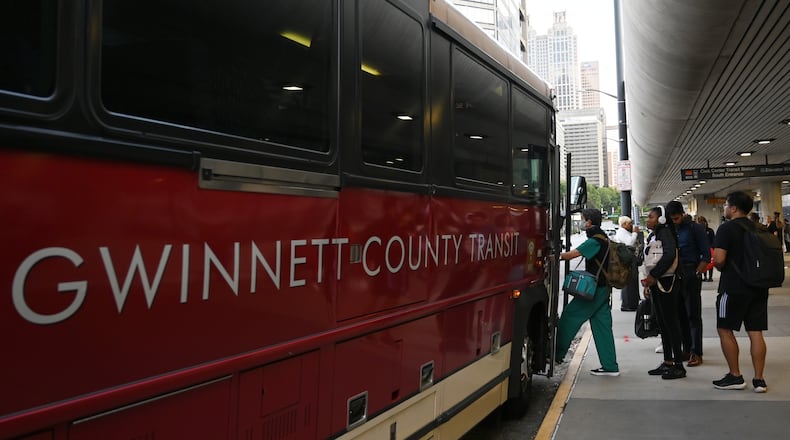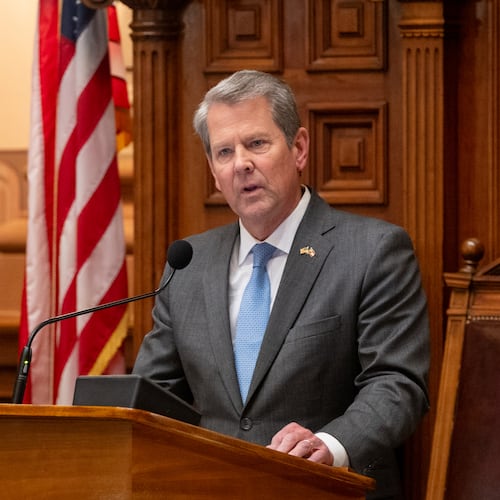With the latest defeat of two transit referendums in Cobb and Gwinnett counties, local leaders must again grapple with the dilemma that has perplexed the Atlanta metro for decades: Traffic is bad and worsening, but voters don’t see dramatic public transit expansion as a solution.
Officials had hoped this would be the year to reverse more than a half century of opposition, but voters in both counties resoundingly defeated the separate measures to impose 1% county-wide sales taxes to fund transit expansion.
The Gwinnett referendum’s defeat marks the fifth time voters have rejected penny sales taxes for transit since 1971. It lost by 28,000 votes. The margin was much worse in Cobb, where the sales tax question only prevailed in one precinct, and that by six-hundredths of a percentage point. It lost by a whopping 95,000 votes.
Transit has always been controversial in the suburban counties, with race often playing a major factor in the outcome. But economic considerations seemed to have led the opposition this year.
“I think this election was big around the economy and pocketbook issues,” said Aisha Yaqoob Mahmood, executive director of the Asian American Advocacy Fund, which campaigned in favor of the taxes in both counties. “This idea of an additional sales tax just didn’t sit well with them.”
Meanwhile, both counties are continuing to grow and add more cars to jammed roadways. According to the Atlanta Regional Commission, a quarter million people will move to Gwinnett and about 150,000 to Cobb in the next 25 years.
Even opponents of the transit taxes agree: Doing nothing isn’t an option.
“As we all know, the longer we delay, the more cost it’s going to be and the tougher it is to achieve it down the road,” said John Loud, a former head of the Cobb Chamber of Commerce who campaigned against this tax but said his issue was with the plan itself, not the need for a transit solution.
But both county commissions have limited options without the tens of billions of dollars the taxes would have brought in over 30 years. And neither of the two county commission chairwomen indicated plans to put the issue back before voters any time soon.
Especially in Gwinnett, which has rejected three proposals in five years, there’s a sense that voters have spoken and made their position clear.
“With each failure, it makes it harder for the next one to pass,” said Fred Hicks, a veteran Democratic political strategist.
Losing ground
The outcome wasn’t even close in Cobb, where 62% of voters shot down the proposal. In some Marietta-area precincts, “no” votes topped 75%.
Opposition was lowest in higher-traffic areas along Interstates 75 and 285. One of the most supportive precincts was in Cumberland where the Braves’ stadium sits, but even there support topped out at 50%.
Transit advocates and political insiders had been pessimistic about the chances of Cobb’s referendum passing. But in Gwinnett, where the 2020 transit referendum failed by just a tenth of a percent, supporters were much more optimistic about their chances of success this go-around.
Instead, they lost ground and 53% opposed it. Support fell by the largest margins in areas that backed transit the most four years ago, and it was the loss of these former “yes” votes that doomed the proposal.
The areas surrounding Interstate 85 have long been more supportive of transit than the rest of the county. That trend continued this year, but voter approval in the area around Norcross weakened significantly.
Support fell by 13 percentage points in one precinct that had backed the 2020 referendum by a two-to-one margin. The southernmost tip of the county, which voted in favor of the 2020 referendum, flipped entirely from support to opposition. And every precinct but one that opposed transit in 2020 did so again this year, albeit by similar margins as before.
Matthew Charlton, 18, lives east of Snellville in a precinct that flipped in the last four years from support to opposition. He voted for Kamala Harris in his first election. But when he reached the bottom of the ballot and saw a tax, he checked “no.” He said he didn’t know anything else about the measure.
Jeffrey Dean, 20, lives in Grayson and also voted for Harris. He left the transit question blank, saying the area didn’t need more buses.
“If we had a whole bunch of people hanging around here, loitering and stuff like that, I don’t think it would benefit the community,” Dean said as he refueled his car on U.S. 78.
Hicks, the political strategist, said officials need to pay attention to ticket splitting like that, which happened in 2020 as well, when Gwinnett voters backed President Joe Biden by much wider margins than transit. They can’t count on voters to align their votes for party and policy they way they once did.
“The old notion that people attach those two together is just that, an old notion,” Hicks said. “We need to move beyond that and understand that people are going to look at each major item on the ballot separate from the other major items on the ballot.”
An anti-tax cycle
Winning approval for a new tax is always an uphill battle because people reflexively don’t want to vote for something that increases their cost of living, political experts say.
Lance Lamberton, one of the loudest critics of the proposal in Cobb, said inflation was absolutely a factor. Voters don’t want to pay higher taxes on top of rising costs elsewhere, he said, and they especially don’t want to pay for a proposal they don’t see benefiting them.
“People don’t really see it as a good taxpayer investment when you consider the cost versus the benefit,” Lamberton said. “The costs far exceed whatever benefit there would be.”
The Cobb tax was projected to raise almost $11 billion over 30 years. In larger Gwinnett, it was projected to bring in $12.4 billion in the same time frame.
Many other transportation-related sales tax referendums across the country also were unsuccessful. New taxes were especially likely to be shot down. Out of 12 new sales taxes proposed across the country only four were approved; the two others that passed were extensions of existing taxes.
Hicks said Cobb and Gwinnett needed to convince voters that enhanced transit would offset the increase in taxes. He helped advise the 2019 effort in Gwinnett and said voters that year told pollsters they lived there specifically to avoid paying transit taxes over the county line in DeKalb.
“They valued their low tax rate more than they did the perceived benefits of transportation, and I think that continues to be the case here,” Hicks said.
When it comes to regular Special Purpose Local Option Sales Taxes which largely fund county transportation departments, people who hit a pothole know the money will go toward road resurfacing, and they see a benefit for themselves, he said. If someone doesn’t currently use transit, it’s hard for them to visualize how they’d benefit from future, far-off improvements.
Hicks said he thought it was a mistake for the counties to campaign so heavily around specific project lists, saying a better message would have been to emphasize how transit would connect people to better-paying jobs or to recreational and entertainment areas.
Mahmood’s group canvassed in areas of Gwinnett with competitive legislative races and in Cobb where school board members were on the ballot. People didn’t want to talk about the presidential election, she said, but they were excited to talk about transit.
In retrospect, she said, canvassers didn’t sufficiently explain the financial benefits of transit expansion over time, such as better access to job and educational opportunities.
“We needed to do better messaging on how it economically benefits people,” she said.
Cobb Commission Chairwoman Lisa Cupid said she thought limited voter awareness about the plans also was a factor. She said more time to campaign would have helped because many voters she talked to idn’t know much about how the sales tax would be used.
“When I talked to voters, it was less opposition and more, ‘what is this?’” Cupid said. ”That doesn’t mean there wasn’t opposition, and I’m not overlooking that, but what I heard more was people not knowing what this measure was.”
Lamberton rejects that notion.
“We had as much time as her,” he said.
Now what?
Now both counties are headed back to the drawing board to try and figure out how to build a winning coalition in support of transit — or alternative ways to pay for it.
Gwinnett County can continue partnering with cities to expand door-to-door on-demand microtransit, commission Chairwoman Nicole Love Hendrickson said, pointing to a recently implemented zone in the Norcross area as an example. But earlier this year, the Norcross City Council balked at the cost, prompting the county and Gateway85 Community Improvement District to pay more.
“We’re not going to raise $12 billion off the backs of property owners,” Hendrickson said. “We don’t expect this to be a quick fix and we don’t anticipate raising taxes on property owners to fund it.”
Charlotte Nash, the longtime former Gwinnett county chair who presided over the failed transit referendums in 2019 and 2020, sits on the Atlanta-Region Transit Link Authority, which the legislature created because transportation issues were harming economic development.
Now that many employers are bringing workers back to offices, Gwinnett and Cobb counties need better ways to bring people to their job centers, Nash said. Many Gwinnettians also travel to the Emory University area, or as far as Athens and Gainesville, for work, Nash said.
“It’s not just about downtown Atlanta, and that wasn’t the case even a decade ago,” she said. “I don’t know how transit is going to do what it needs to do from an employment standpoint, if it doesn’t make it easier to reach the areas where there are jobs.”
In Cobb, most of the projects proposed don’t have a funding source without the sales tax, but Cupid said she hoped county officials could find smaller-scale ways to improve mobility that would fit into the budget.
Voters have been supportive of transportation-related projects covered by SPLOST sales taxes, so Cupid believes there are opportunities to garner support for parts of the transit plan. It might even be easier to have those conversations now, she said.
“Now we can talk less about a referendum and more about mobility,” Cupid said.
Keep Reading
The Latest
Featured






